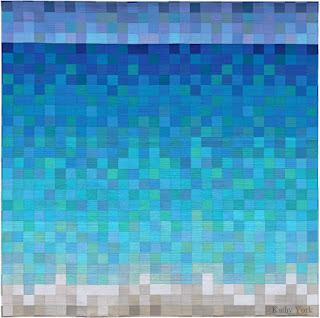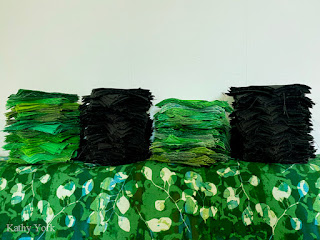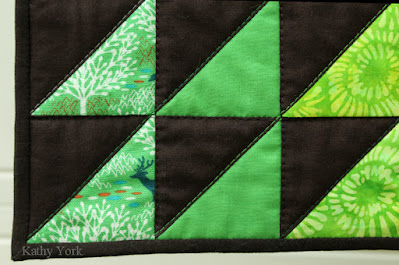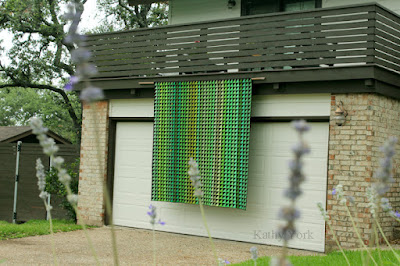AQS Paducah
2023
I decided to try to expand my horizons by entering a new quilt show. I didn't know much about this show except that it was a juried show, and that it was highly regarded.
I remember the entry fee was a bit expensive, $40, and I don't remember if that was for multiple entries, or per quilt, and it didn't matter because I only had one quilt to enter. It was less expensive for members, but then the members also have to pay a membership fee. And for me, the $40 was cheaper. They do have amazing cash awards for the prize winners, but I already knew that my quilt was not going to be one of those. They show previous winners on their website, and my quilt was a different kind of quilt. Which is why I was surprised and elated that it got in!
They also state that they will NOT show both sides if you have a two-sided quilt. That is apparently not true for the prize winning quilts (which I already knew mine would not be, and it did not win a prize, so I called that one!). However, I assumed or hoped that there would be volunteers with white gloves showing the backs of quilts. I don't know if that was true or not, as I did not go to the show.
What I didn't know, and turned out to be a deal breaker for me is that they do not print your artist statement on the signage. This led me to question why they asked for it on the entry form? It turns out that during the awards ceremony, the artist statement is read aloud for the winning quilts. For all the other quilts, including mine, it simply does not matter why I made the quilt, or what story it tells. And, since only half of my quilt was being shown, the white privilege side, none or few of the viewers got to see what the quilt was really about. And that kind of broke my spirit. It was the exact opposite of the goal of this quilt, to shine a light on the relationship between white privilege and racial inequities. See previous post
here.
My artist statement, (this is the expanded form because AQS limits the number of words you can include on the entry form):
This two sided quilt tells the story of the gaiety of abundance and bleakness of scarcity. On the front side the fawns have plenty to eat and are surrounded by whimsical birds and flowers. On the back side the fawns are in a barren land, separated from the flowers they need for survival by a giant barrier. A symbol of our own border, the work hints at a metaphor for success built from a racist system that rewards the lighter skinned fawns and deprives the darker skinned fawns. The story is not complete without both sides. An additional layer of transparency to the issue is shown when the quilt is backlit and elements of the other side can be seen regardless of which side you are standing on
Also, during the awards' ceremony, the announcer seemed to be the most impressed with the number of pieces a winning quilt had. That was mentioned at least 3 or 4 times. That is not the thing which I value most about quilts. And certainly has no relevancy in what I choose to make. My favorite things about great quilts are the design and color. If the quilt is meaningful on another level, it takes the quilt to another level for me. Craftsmanship is also key, but not a deal breaker. It can't be so bad that it distracts from the design, but it doesn't need to be hyper dense layers of stitching that look like it was programmed by a computer. Those are certainly amazing, but just not really my cup of tea.
Then, I got the quilt back with the judges' comments. It is not the first time I have received irrelevant and less than helpful comments. To be fair, the judges have a lot of quilts to judge and usually in a short amount of time. I doubt they were writing the comments themselves, they likely had a scribe. Additionally the scoring cards do not show the criteria that your quilt is being judged for. It simply lists a nice comment and a "to help your quilt better compete" comment. And the later for mine was "straight lines should be straight". Okay, that is probably true, but my quilt doesn't have straight lines. It is a curvy organically drawn with hot gloopy wax quilt. It really left me questioning....?
Last, my goal in showing my quilts is to pass the inspiration on. The inspiration to make something flows to me, and I want to let that inspiration continue to flow by letting the quilt travel and get to be seen. It is not about winning awards.
However, it is really expensive to make quilts and show them. This one cost $40 to enter, and $95 in shipping fees. I also paid $75 to get an appraisal. Also, in case you didn't know, AQS keeps $25 of that appraisal fee, and gives only $50 to the actual appraiser. That's a 50% markup in the price of the appraisal. It doesn't sit well with me. Next time I will get an appraisal from someone local and not during a quilt show (certainly not an AQS quilt show). Which leads to the question, why even get an appraisal? That appraisal is key if the quilt gets lost in shipping (and mine has on 3 different occasions).
And, all of this does not include the costs to make the quilt. I appreciate so much the sponsors who pay the cash awards for prizes. And, I really like winning awards because it helps immensely with some of these costs. It also feels really nice to win an award, especially for something that you have worked so hard to make. Quilts are best seen in person, and quilt shows help further that goal. I am grateful that AQS is continuing to host these shows, but I will not be entering here again.
Many thanks to Andrea Brokenshire, who went to the show and sent me these photos! And, many congrats to her gorgeous and winning quilts!














